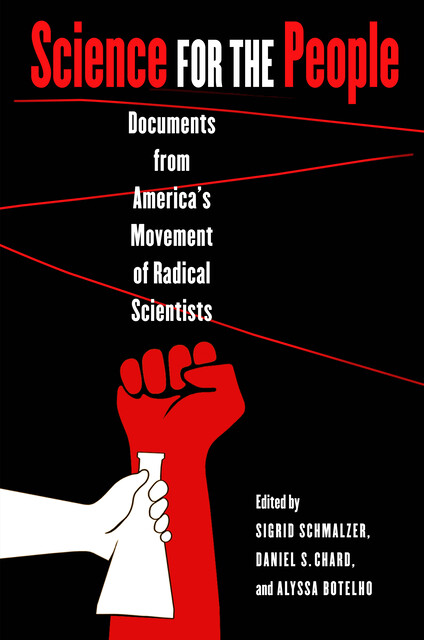Contents
Preface
Introduction: Science for the People, 1970s and Today
Chapter 1: Science, Power, and Ideology
Ben Allen and Sigrid Schmalzer
Document 1.1. Bill Zimmerman, Len Radinsky, Mel Rothenberg, Bart Meyers, “Toward a Science for the People” (1972)
Document 1.2. Norman Diamond, “The Politics of Scientific Conceptualization” (1976)
Document 1.3. Steven Rose, “The Limits to Science” (1984)
Document 1.4. Richard Levins, “One Foot In, One Foot Out” (2014)
Chapter 2: Disrupting the “AAA$”
Colin Garvey and Daniel S. Chard
Document 2.1. Charles Schwartz, “Should APS Discuss Public Issues? For the Schwartz Amendment” (1968)
Document 2.2. “A History of the AAA$” (1970)
Document 2.3. Chicago SESPA, “SESPA Tells It Like It Is: Opening Statement AAA$ ‘70” (1971)
Document 2.4. AAA$ Action ’70 Resolutions Committee, “Resolutions for the AAA$” (1970)
Document 2.5. “Second Annual Dr. Strangelove Award for Edward Teller” (1971)
Document 2.6. The Boston Travellers, “1970 Chicago AAAS Actions: Review and Critique” (1971)
Document 2.7. “Leaflet Handed Out at One AAAS Session” (1972)
Document 2.8. FBI Report on Science for the People (1972)
Document 2.9. FBI teletype, Boston Field Office to Acting FBI Director L. Patrick Gray (1972)
Document 2.10. “Call to AAAS Actions” (1973)
Chapter 3: Militarism
Daniel S. Chard
Document 3.1. FBI, Letterhead Memorandum on Scientists and Engineers for Social and Political Action (1970)
Document 3.2. Jan Brown, Martin Brown, Chandler Davis, Charlie Schwartz, Jeff Stokes, Honey Well, and Joe Woodward, Science against the People: The Story of Jason (1972)
Document 3.3. Science for the People Madison Wisconsin Collective, The AMRC Papers: An Indictment of the Army Mathematics Research Center (1973)
Document 3.4. “Challenging the Weapons Labs: An Interview with the University of California Nuclear Weapons Labs Conversion Project" (1981)
Document 3.5. Steve Nadis, “After the Boycott: How Scientists Are Stopping SDI” (1988)
Chapter 4: Biology and Medicine
Alyssa Botelho
Document 4.1. Rita Arditti and Tom Strunk, “Objecting to Objectivity: A Course in Biology” (1972)
Document 4.2. The Genetic Engineering Group, “Actions on XYY Research” (1975)
Document 4.3. Elizabeth Allen et al., “Against ‘Sociobiology’” (1975)
Document 4.4. Bob Park and Scott Thacher, “Dealing with Experts: The Recombinant DNA Debate” (1977)
Document 4.5. John Valentine, “The Politics of Cancer Research” (1980)
Chapter 5: Race and Gender
Alyssa Botelho
Document 5.1. “Equality for Women in Science” (1970)
Document 5.2. Larry Miller, Herb Schreier, and Jon Beckwith, “Racist Outbreak at Harvard Medical School” (1976)
Document 5.3. Doug Futuyma, “Is There a Gay Gene? Does It Matter?” (1980)
Document 5.4. Richard Lewontin, “Are the Races Different?” (1982)
Chapter 6: Agriculture, Ecology, and Food
Sigrid Schmalzer
Document 6.1. John Vandermeer, “Ecological Determinism” (1977)
Document 6.2. Richard Lewontin, “Agricultural Research and the Penetration of Capital” (1982)
Document 6.3. “Harvest of Shame” (in Feed, Need, Greed) (1980)
Document 6.4. Uriel Kitron and Brian Schultz, “Alternatives in Agriculture: A Report from the New World Agriculture Group” (1983)
Chapter 7: Technology
Thomas Conner and Sigrid Schmalzer
Document 7.1. Herb Fox, “Technical Assistance Program” (1970)
Document 7.2. David Chidakel, “The New Robots” (1975)
Document 7.3. Seth Shulman, “Emerging Technologies: Toward a Blueprint for Action” (1985)
Document 7.4. Bertram Bruce, “Taking Control of Educational Technology” (1985)
Document 7.5. David Dickson, “Chossing Technology” (1987)
Chapter 8: Energy and Environment
Ben Allen, Alyssa Botelho, and Daniel S. Chard
Document 8.1. Science for the People, Nuclear Power (1976)
Document 8.2. Carol Cina and Ted Goldfarb, “Three Mile Island and Nuclear Power” (1979)
Document 8.3. J. Larry Brown and Deborah Allen, “Toxic Waste and Citizen Action” (1983)
Chapter 9: Science for the People and the World
Daniel S. Chard
Document 9.1. Red Crate Collective, “Help for Science Education in Cuba and Vietnam” (1971)
Document 9.2. Mark Ptashne, “A Scientific Visit to Hanoi” (1971)
Document 9.3. “Toward an Anti-Imperialist Science” (1973)
Document 9.4. Science for the People, China: Science Walks on Two Legs (1974)
Document 9.5. Michael Harries and Victor Lopez-Tosado, “Science for Nicaragua: Cooperation in Technology and Science Education” (1986)
Further Reading
Contributors
Index


